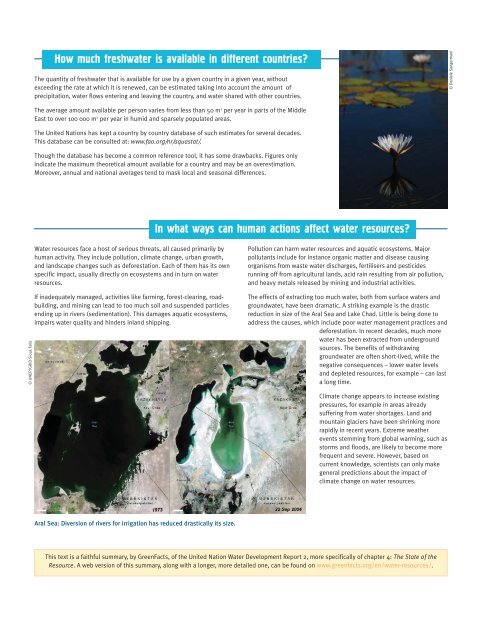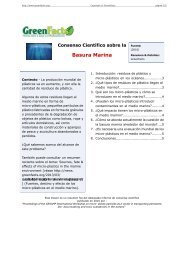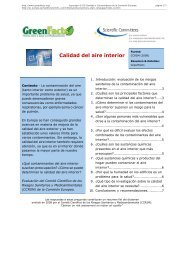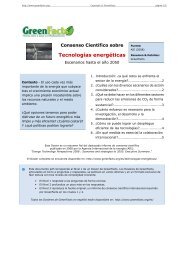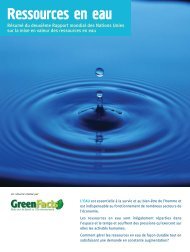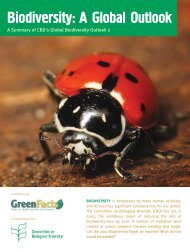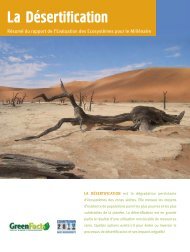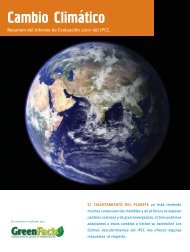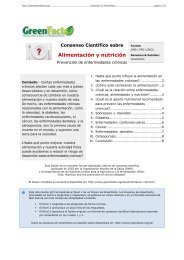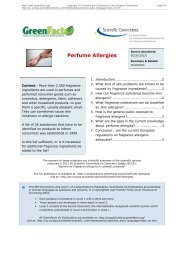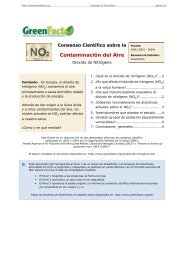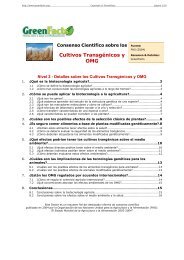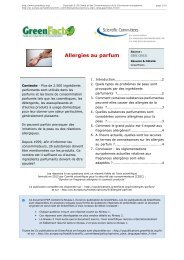Facts on Water Resources - GreenFacts
Facts on Water Resources - GreenFacts
Facts on Water Resources - GreenFacts
You also want an ePaper? Increase the reach of your titles
YUMPU automatically turns print PDFs into web optimized ePapers that Google loves.
How much freshwater is available in different countries?The quantity of freshwater that is available for use by a given country in a given year, withoutexceeding the rate at which it is renewed, can be estimated taking into account the amount ofprecipitati<strong>on</strong>, water flows entering and leaving the country, and water shared with other countries.© Daniele SangermaniThe average amount available per pers<strong>on</strong> varies from less than 50 m 3 per year in parts of the MiddleEast to over 100 000 m 3 per year in humid and sparsely populated areas.The United Nati<strong>on</strong>s has kept a country by country database of such estimates for several decades.This database can be c<strong>on</strong>sulted at: www.fao.org/nr/aquastat/.Though the database has become a comm<strong>on</strong> reference tool, it has some drawbacks. Figures <strong>on</strong>lyindicate the maximum theoretical amount available for a country and may be an overestimati<strong>on</strong>.Moreover, annual and nati<strong>on</strong>al averages tend to mask local and seas<strong>on</strong>al differences. ?In what ways can human acti<strong>on</strong>s affect water resources?© UNEP/GRID-Sioux Falls<strong>Water</strong> resources face a host of serious threats, all caused primarily byhuman activity. They include polluti<strong>on</strong>, climate change, urban growth,and landscape changes such as deforestati<strong>on</strong>. Each of them has its ownspecific impact, usually directly <strong>on</strong> ecosystems and in turn <strong>on</strong> waterresources.If inadequately managed, activities like farming, forest-clearing, roadbuilding,and mining can lead to too much soil and suspended particlesending up in rivers (sedimentati<strong>on</strong>). This damages aquatic ecosystems,impairs water quality and hinders inland shipping.Polluti<strong>on</strong> can harm water resources and aquatic ecosystems. Majorpollutants include for instance organic matter and disease causingorganisms from waste water discharges, fertilisers and pesticidesrunning off from agricultural lands, acid rain resulting from air polluti<strong>on</strong>,and heavy metals released by mining and industrial activities.The effects of extracting too much water, both from surface waters andgroundwater, have been dramatic. A striking example is the drasticreducti<strong>on</strong> in size of the Aral Sea and Lake Chad. Little is being d<strong>on</strong>e toaddress the causes, which include poor water management practices anddeforestati<strong>on</strong>. In recent decades, much morewater has been extracted from undergroundsources. The benefits of withdrawinggroundwater are often short-lived, while thenegative c<strong>on</strong>sequences – lower water levelsand depleted resources, for example – can lasta l<strong>on</strong>g time.Climate change appears to increase existingpressures, for example in areas alreadysuffering from water shortages. Land andmountain glaciers have been shrinking morerapidly in recent years. Extreme weatherevents stemming from global warming, such asstorms and floods, are likely to become morefrequent and severe. However, based <strong>on</strong>current knowledge, scientists can <strong>on</strong>ly makegeneral predicti<strong>on</strong>s about the impact ofclimate change <strong>on</strong> water resources.Aral Sea: Diversi<strong>on</strong> of rivers for irrigati<strong>on</strong> has reduced drastically its size.This text is a faithful summary, by Green<str<strong>on</strong>g>Facts</str<strong>on</strong>g>, of the United Nati<strong>on</strong> <strong>Water</strong> Development Report 2, more specifically of chapter 4: The State of theResource. A web versi<strong>on</strong> of this summary, al<strong>on</strong>g with a l<strong>on</strong>ger, more detailed <strong>on</strong>e, can be found <strong>on</strong> www.greenfacts.org/en/water-resources/.


